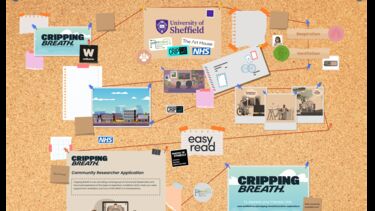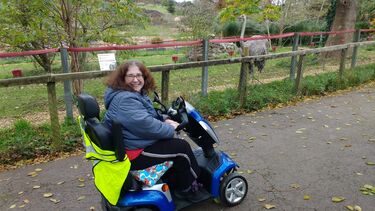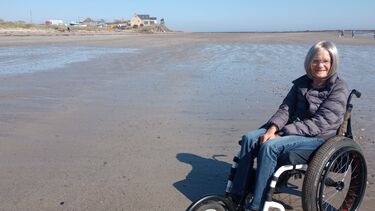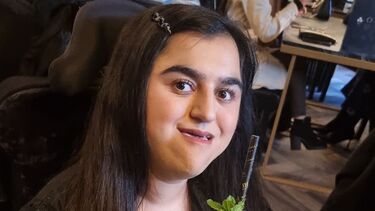Blog post #7 Experts by experience: Our Community Â鶹ÊÓƵer Cooperative
By Haffizah Ali, Ruth Bridgens and Amanda Jones, with Suzanne Glover, Jen Kettle and Julie Ellis
- This blog post explains what our Community Â鶹ÊÓƵer Cooperative is and the role of community researchers in the co-produced Cripping Breath project.
- It introduces members of our community researcher team.
- It describes how we are working together using our different experiences and expertise to design and manage the project.
- It discusses why co-production is so important in our research and how it will help to ensure the outputs from our work make a difference to diverse communities of ventilation users.
What’s a Community Â鶹ÊÓƵer Cooperative?
We are a group of 10 individuals who have personal experience of using a ventilator/ breathing support. We are members of the Cripping Breath team and are experts-by-experience. As paid researchers employed by the University of Sheffield, our knowledge and lived experiences are a valuable driving force behind the project and we are responsible for co-designing and co-leading the research with members of the broader team. We are based primarily within the narrative stream and since joining the project in January we have been busy collaborating remotely to design our research plans, propose interview questions, support with ethics applications and advise our colleagues in the other project work streams. Soon we'll be recruiting our participants and collecting data for the project, carrying out virtual narrative interviews and using photovoice to capture peoples' stories of ventilation. Some of us have prior research experience, others none at all. We are a diverse group in terms of why we need ventilation to support our breathing, and we live all over the UK and Northern Ireland. We each applied to be a community researcher with the project based on just two criteria: lived experience of ventilation and a passion for learning about the experiences of others. But of course, we each have our own reasons for wanting this role and particular motivations and aspirations drive our work.
Why get involved with Cripping Breath?
Amanda: ‘I feel valued with my voice heard’
I am Amanda from Devon. Living with disability has meant adapting my life around many aspects. I have rare diseases which are difficult to manage including . My interests are creative writing, music, art and crafts. I love wildlife and my garden and I’m grateful for people who help me participate. It has been difficult to change my work, hobbies and life around disability having been a walker and sporty person previously. Now I use my mobility scooter and wheelchair to get around. Belonging to Cripping Breath means I can relate to my peers with respiratory illness in a collaborative way as we work together. I feel valued with my voice heard as we work towards improving health and attitudes with people like us who live with ventilators.
Ruth: ‘I'm thrilled to have the chance to explore ventilation stories’&²Ô²ú²õ±è;
I had mild at age 2 which mainly affected my left side. I recovered well but knew from an early age that my arms were weak. In my 30s, working in ceramics, I began to have problems walking and using my arms. Within 10 years I was using a wheelchair and voice recognition to write. It took me many years to get a diagnosis of and, in the early 2000s, I got a PhD in medical sociology, looking at the and were now dealing with post-polio problems. Around this time I slowly began to develop signs of breathing problems, and, even after a test of raised CO2, it took six years to get a diagnosis of hypoventilation, or more specifically (high CO2). In 2022, I finally started using BiPAP. Over the years, I have tried to get more recognition and understanding of post-polio syndrome, a very misunderstood condition, and now I'm thrilled to have the chance to explore ventilation stories with those who use it, and hope to help increase the understanding and recognition of ventilation for the medical profession, patients with breathing problems and the general public.
Haffizah: ‘I'm aware of the general lack of understanding around ventilation’
Hi, I’m Haffizah! I’m 18 and currently studying Biology, Chemistry, and Psychology at sixth form, with hopes to study Biology at university this September. I wanted to be part of Cripping Breath because as a ventilator user myself, I'm aware of the general lack of understanding around ventilation, and I’m passionate about highlighting the journeys and experiences of other ventilator users to help broaden society’s understanding of what it’s really like to live with and use ventilation. In my spare time, I enjoy trying new foods at different restaurants and getting lost in fictional crime novels - is my favourite author, and I’m currently reading The New Neighbour.
Leading with experience: why our roles are important
And so, as researchers with different lived experiences of ventilation we bring valuable non-academic expertise to Cripping Breath as a co-produced project. Together with our colleagues we are challenging the hierarchical ways in which most knowledge is produced - focusing instead on principles of equity, accessibility and reciprocity in the research process. Sharing our stories as community researchers is important because despite the positive increase in, and awareness of, participatory research, often non-academic co-researchers are involved in research in limited or tokenistic ways. In particular we tend to be excluded from aspects of the research process such as data analysis, writing for publication or presenting at conferences, where traditional ideas about how knowledge should be generated and by whom seem to linger more stubbornly. In Cripping Breath we are looking forward to being involved in all stages of the research including co-leading public engagement, dissemination activities and writing publications ( for examples of how this can be done). After all, as members of the very communities who are potential beneficiaries of this research, we know exactly why this work is important and how it can make a difference.




